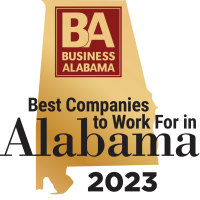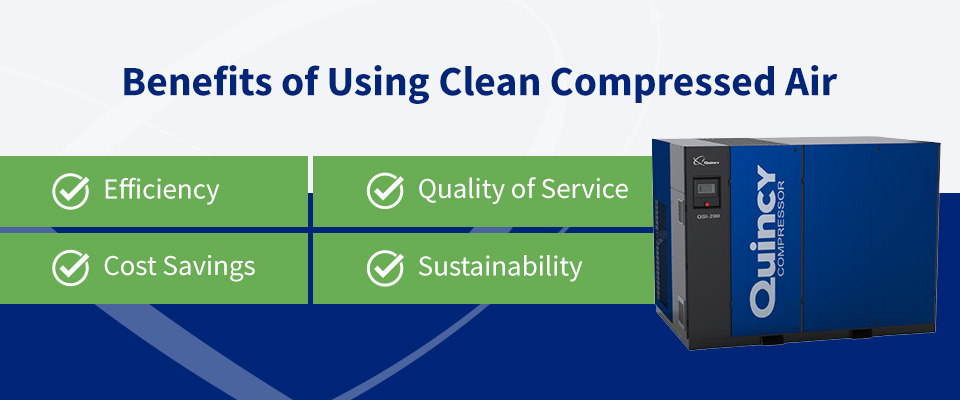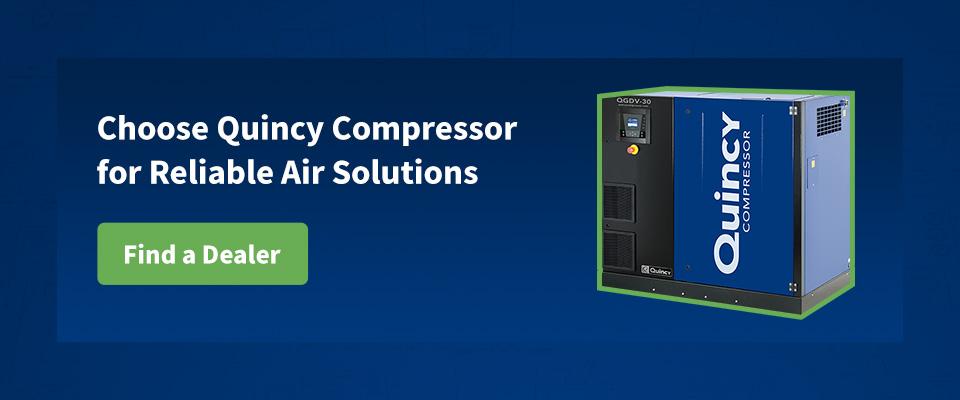
Compressed air systems are indispensable tools for many industries, from automotive to pharmaceutical. They also play a major role in dry cleaning. These tools help power dry cleaning machines and leave customers with top-quality results.
So, how is compressed air used in dry cleaning? What types of air compressors should you consider? Understanding the inner workings of these tools may help you decide which air compressor is right for your business.
Applications of Compressed Air in Dry Cleaning
Let’s explore how you can use an air compressor for cleaning.
1. Pre-Spotting
Before garments begin the main cleaning process, they are often pre-treated to remove stains. Compressed air can blow out loose dirt and debris from fabrics, making the subsequent chemical treatments more effective.
2. Stain Removal Tools
There are special tools powered by compressed air, such as steam guns and spotting guns. Dry cleaners can use these tools to apply cleaning solutions and remove stubborn stains. They combine air pressure with cleaning agents to penetrate fabric fibers and lift stains without causing damage.
3. Steam Pressing
Air compressors power steam presses, which smooth out wrinkles and restore garments’ shape. The steam, combined with the press’s pressure, provides a crisp, professional finish.
4. Air Blowers
After pressing, air blowers help remove residual moisture from garments. This step is crucial for ensuring that clothes are completely dry and ready for wear.
5. Pneumatic Conveyors
Pneumatic conveyor systems use compressed air. They move garments through various stages of the cleaning process.
6. Automated Assembly Lines
In larger operations, compressed air powers automated assembly lines that sort, tag and package garments.
7. Dust and Lint Removal
Compressed air can help clean lint traps, filters and other parts of dry cleaning machines. Maintaining machines helps prevent blockages and keeps them running efficiently.
8. Leather and Suede Cleaning
Cleaning leather and suede requires careful handling. Compressed air tools help apply cleaning agents evenly and remove dirt without saturating the material.
Types of Air Compressors Suitable for Dry Cleaning
There are two types of air compressors that are suitable for dry cleaners. Let’s discuss the differences between them.
Rotary Screw Air Compressors
Rotary screw air compressors use two meshing helical screws (rotors) to compress air. As the rotors turn, they reduce the volume of the air, which increases its pressure.
These compressors can provide the following advantages:
- High efficiency: Known for energy efficiency, especially in continuous operation and at higher pressures, these machines deliver more air per unit of input power.
- Low noise and vibration: These compressors are generally quieter and produce less vibration during operation. This is beneficial for noise-sensitive environments.
- Continuous operation: Rotary screw compressors are designed for continuous duty cycles, making them ideal for applications where a consistent and reliable supply of compressed air is needed.
You’ll also want to remember the following potential disadvantages:
- High initial cost: These air compressors typically have a higher initial purchase cost, especially for larger models.
- Complex design: The intermeshing screws require precise manufacturing and maintenance. Because of this, repair costs may increase if issues arise.
Reciprocating (Piston) Air Compressors
Reciprocating air compressors use pistons driven by a crankshaft to deliver air at high pressure. The piston moves up and down inside a cylinder, creating compression by displacing air and then compressing it.
Consider this type if you’re looking for:
- Low initial costs: Generally, reciprocating compressors are less expensive to purchase.
- Simple designs: Piston air compressors are easier to understand and maintain, and their parts are generally more accessible and simpler to replace.
- Versatility: These compressors can handle various air pressures and volumes, making them suitable for various applications.
Potential cons of reciprocating air compressors include:
- High operating noise: These compressors tend to be noisier during operation, which can be a concern in quieter working environments.
- Limited continuous duty: Larger reciprocating compressors may struggle with prolonged continuous operation due to heat buildup and wear on moving parts.
Now, there’s another factor to consider — oil-free vs. oil-injected air compressors. In dry cleaning, purity is paramount. As such, oil-free air compressor systems are recommended.
Benefits of Using Clean Compressed Air
Dry cleaners may experience the following benefits when using clean compressed air in their business operations.
Efficiency
Clean compressed air ensures that dry cleaning equipment operates consistently and reliably. The air can reach into tight crevices and folds of garments, effectively removing dust and debris that traditional methods might miss.
As a result, compressed air helps reduce the time and effort required for pre-cleaning and applying spot treatments, allowing businesses to handle more garments in less time. Additionally, clean compressed air aids in the rapid drying and finishing of garments, further streamlining processes and increasing overall productivity.
Cost Savings
Using clean compressed air can lead to substantial cost savings. Because of its precision, it may reduce the need for chemicals, lowering expenses. Additionally, energy-efficient compressors consume less electricity, possibly reducing utility bills.
Clean air systems also prevent wear and tear on equipment, minimizing maintenance and replacement costs. Furthermore, efficient drying processes conserve water, reducing water-related expenses. These savings collectively help enhance your business’s profitability.
Quality of Service
Clean compressed air ensures high-quality cleaning results — results that customers want. By preventing contaminants from entering the cleaning process, it reduces the risk of stains, odors and fabric damage, leading to consistently clean, fresh garments that meet customer expectations.
High-quality service leads to greater customer satisfaction, repeat business and positive word-of-mouth referrals.
Sustainability
Reduced chemical reliance and water usage minimize environmental impact, and energy-efficient compressors can help lower your carbon footprint.
Selecting the Right Air Compressor
Here’s a guide to help you navigate the selection process:
- Assess your requirements: Evaluate your dry cleaning business’s needs. Consider the number of garments processed daily, the types of equipment requiring compressed air and any space limitations in your facility.
- Determine the size and capacity: The air compressor’s size should match your equipment’s demands. Calculate the required cubic feet per minute based on the total air consumption of all pneumatic tools and machines.
- Consider energy efficiency: To minimize operational costs, opt for energy-efficient models. Look for compressors with variable speed drives or energy-saving features.
- Noise levels and environment: Evaluate the air compressor’s noise levels, especially if your facility operates in a residential area or you prefer a quiet work environment.
- Maintenance and reliability: Choose air compressors known for their reliability and ease of maintenance. Consider the availability of service support, spare parts and warranty coverage.
Choose Quincy Compressor for Reliable Air Solutions
If you’re looking for energy-efficient air compressors for your dry cleaning business, look no further than Quincy Compressor. We understand the dry cleaning industry requires equipment that provides clean, precise results, and you can find the air compressor to help — be it rotary screw air compressors or reciprocating piston air compressors — from Quincy Compressor.
Contact us for assistance in deciding which model is right for you and to learn the benefits of compressed air for dry cleaning.



